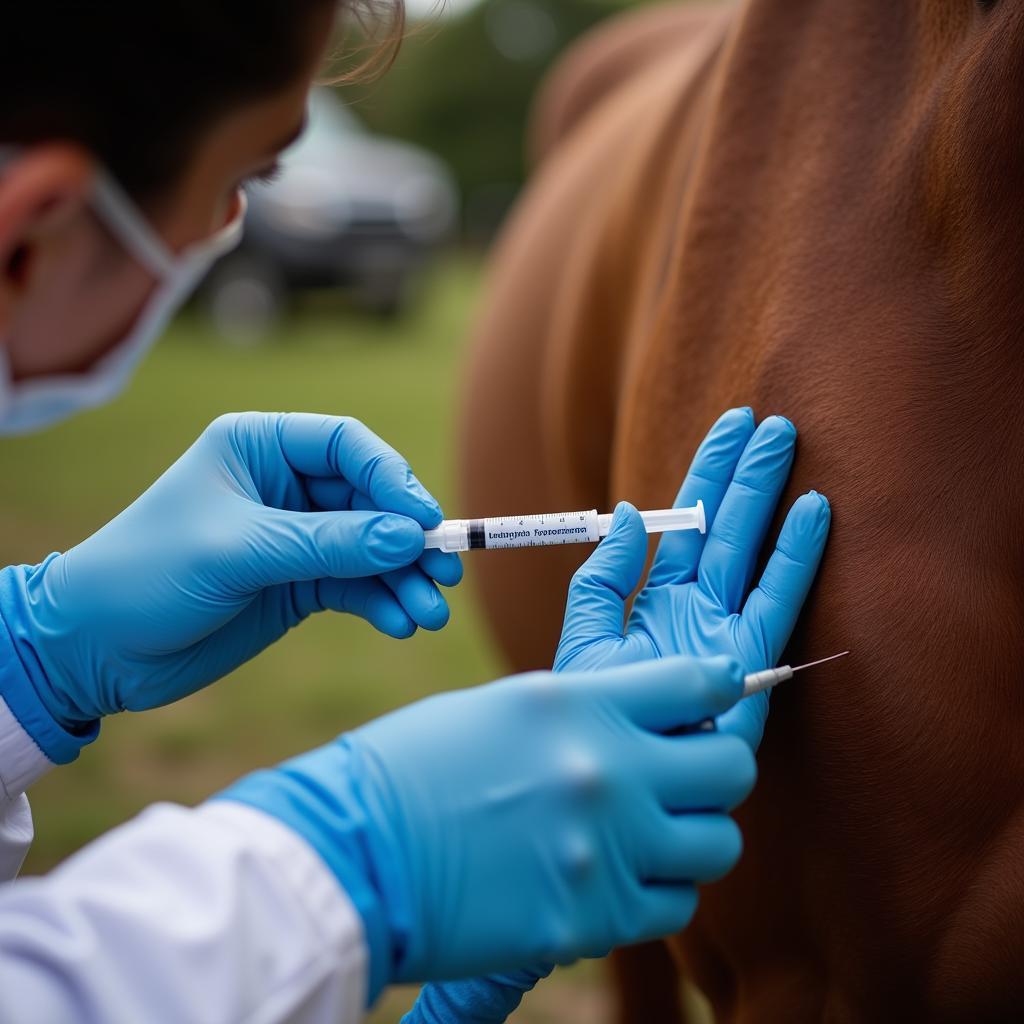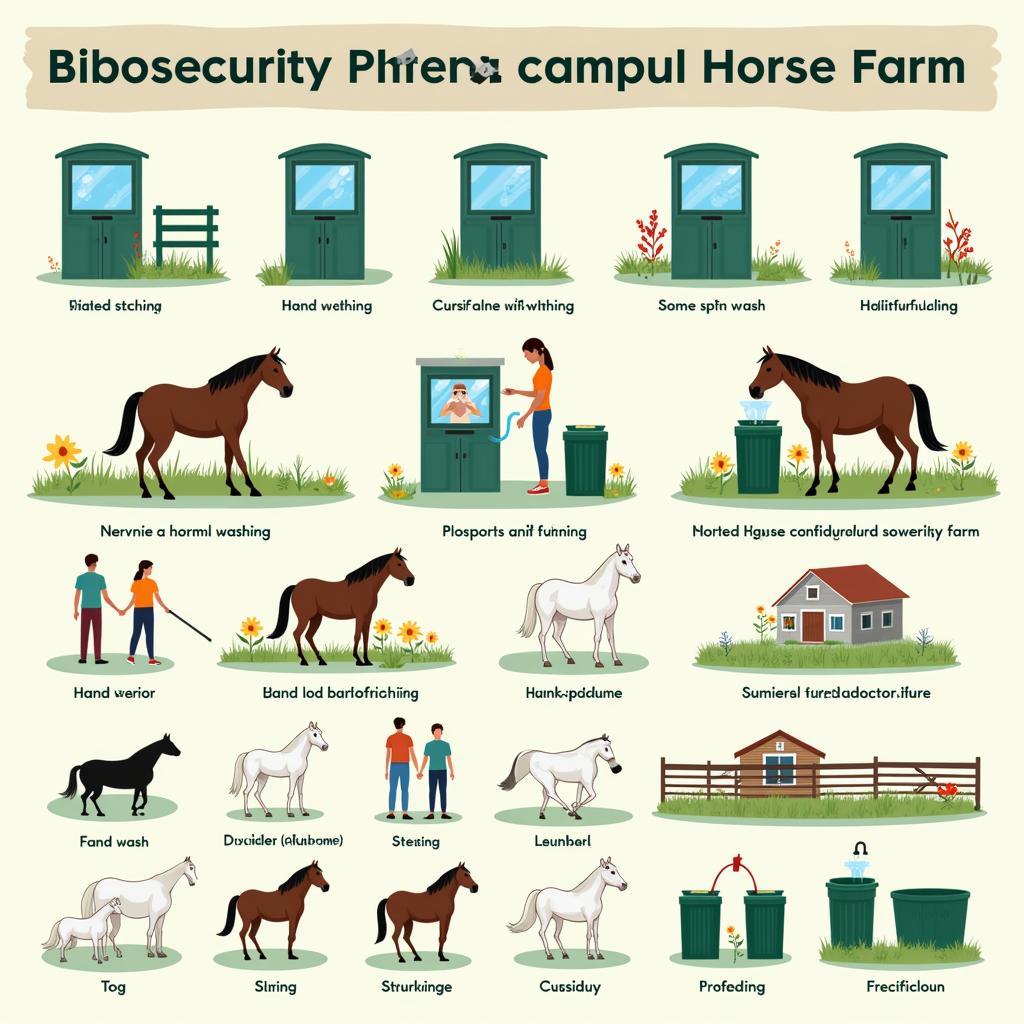Leptospirosis Vaccine Horses is a crucial aspect of responsible horse ownership. Protecting your horse from this bacterial disease is not just about their health, but also about the well-being of your entire farm and even your own family. This comprehensive guide will delve into everything you need to know about leptospirosis, its prevention through vaccination, and how to ensure your horse stays healthy and happy.
Understanding Leptospirosis in Horses
Leptospirosis is a zoonotic disease, meaning it can be transmitted between animals and humans. It’s caused by bacteria belonging to the genus Leptospira, which thrive in moist environments. Horses can contract leptospirosis through contact with contaminated water, urine, or soil. Understanding the various serovars, or strains, of leptospira that affect horses is vital. Some common serovars include Pomona, Grippotyphosa, Hardjo, and Bratislava.
How is Leptospirosis Transmitted?
Horses often become infected by ingesting contaminated water or feed. Rodents, particularly rats, are significant carriers of leptospira and can contaminate water sources with their urine. Open wounds on a horse can also be entry points for the bacteria.
Clinical Signs and Symptoms in Horses
Leptospirosis in horses can manifest in various ways, making diagnosis challenging. Symptoms can range from mild fever and lethargy to more severe complications such as uveitis (inflammation of the eye), abortions in pregnant mares, and even kidney failure.
The Importance of Leptospirosis Vaccine Horses
Vaccinating your horse against leptospirosis is a proactive step towards protecting their health and preventing the spread of this potentially devastating disease. While the vaccine doesn’t guarantee complete immunity, it significantly reduces the risk of infection and minimizes the severity of symptoms should your horse contract the disease.
Types of Leptospirosis Vaccines Available for Horses
There are several types of leptospirosis vaccines available, offering varying levels of protection against different serovars. Some vaccines protect against the four most common serovars (Pomona, Grippotyphosa, Hardjo, Bratislava), while others target specific strains. Consult with your veterinarian to determine the most appropriate vaccine for your horse based on their risk factors and geographical location.
Vaccination Schedule and Booster Recommendations
Typically, the initial leptospirosis vaccine series for horses involves two doses administered 3-4 weeks apart. Annual boosters are then recommended to maintain immunity. Your veterinarian can advise on the specific vaccination schedule best suited for your horse’s needs.
 Horse Receiving Leptospirosis Vaccine
Horse Receiving Leptospirosis Vaccine
Beyond Vaccination: Managing Leptospirosis Risk
While vaccination is crucial, implementing effective management practices is equally important in minimizing the risk of leptospirosis on your farm.
Rodent Control
Controlling rodent populations is essential in preventing the spread of leptospira. Eliminate potential rodent habitats by keeping barns and surrounding areas clean and free of debris. Consider using rodent bait stations, but ensure they are placed safely away from horses and other animals.
Water Management
Provide clean, fresh water sources for your horses. Avoid stagnant water and regularly clean water troughs. If possible, fence off natural water sources that may be contaminated.
Hygiene and Biosecurity
Maintain good hygiene practices on your farm. Regularly clean and disinfect stalls, barns, and equipment. Properly dispose of manure and urine to prevent bacterial growth and contamination.
Protecting Your Horse and Yourself
Remember, leptospirosis is a zoonotic disease. Take precautions to protect yourself and your family. Wear gloves when handling potentially contaminated materials, such as horse manure or urine. Wash your hands thoroughly after contact with horses or their environment.
 Biosecurity Measures on Horse Farm
Biosecurity Measures on Horse Farm
Conclusion
Leptospirosis vaccine horses is a critical component of equine healthcare. By understanding the disease, its transmission, and the importance of vaccination, you can take proactive steps to protect your horse’s well-being. Implementing proper management practices alongside vaccination will further minimize the risk of leptospirosis on your farm, ensuring a healthy and happy environment for your equine companions and yourself.
FAQ
- How often should my horse receive the leptospirosis vaccine? Typically, annual boosters are recommended.
- Can humans get leptospirosis from horses? Yes, leptospirosis is a zoonotic disease and can be transmitted from horses to humans.
- What are the most common symptoms of leptospirosis in horses? Symptoms can include fever, lethargy, uveitis, and reproductive issues.
- Are there different types of leptospirosis vaccines? Yes, different vaccines protect against various strains of leptospira.
- How can I prevent leptospirosis on my farm? Rodent control, water management, and good hygiene practices are key.
- What should I do if I suspect my horse has leptospirosis? Contact your veterinarian immediately.
- Is the leptospirosis vaccine 100% effective? No vaccine is 100% effective, but it significantly reduces the risk and severity of illness.
For further information and assistance regarding leptospirosis and equine health, please contact us. Call: 0772127271, Email: [email protected] Or visit us at: QGM2+WX2, Vị Trung, Vị Thuỷ, Hậu Giang, Việt Nam. We have a 24/7 customer support team ready to assist you. You can also explore other helpful articles on our website regarding equine health and care.